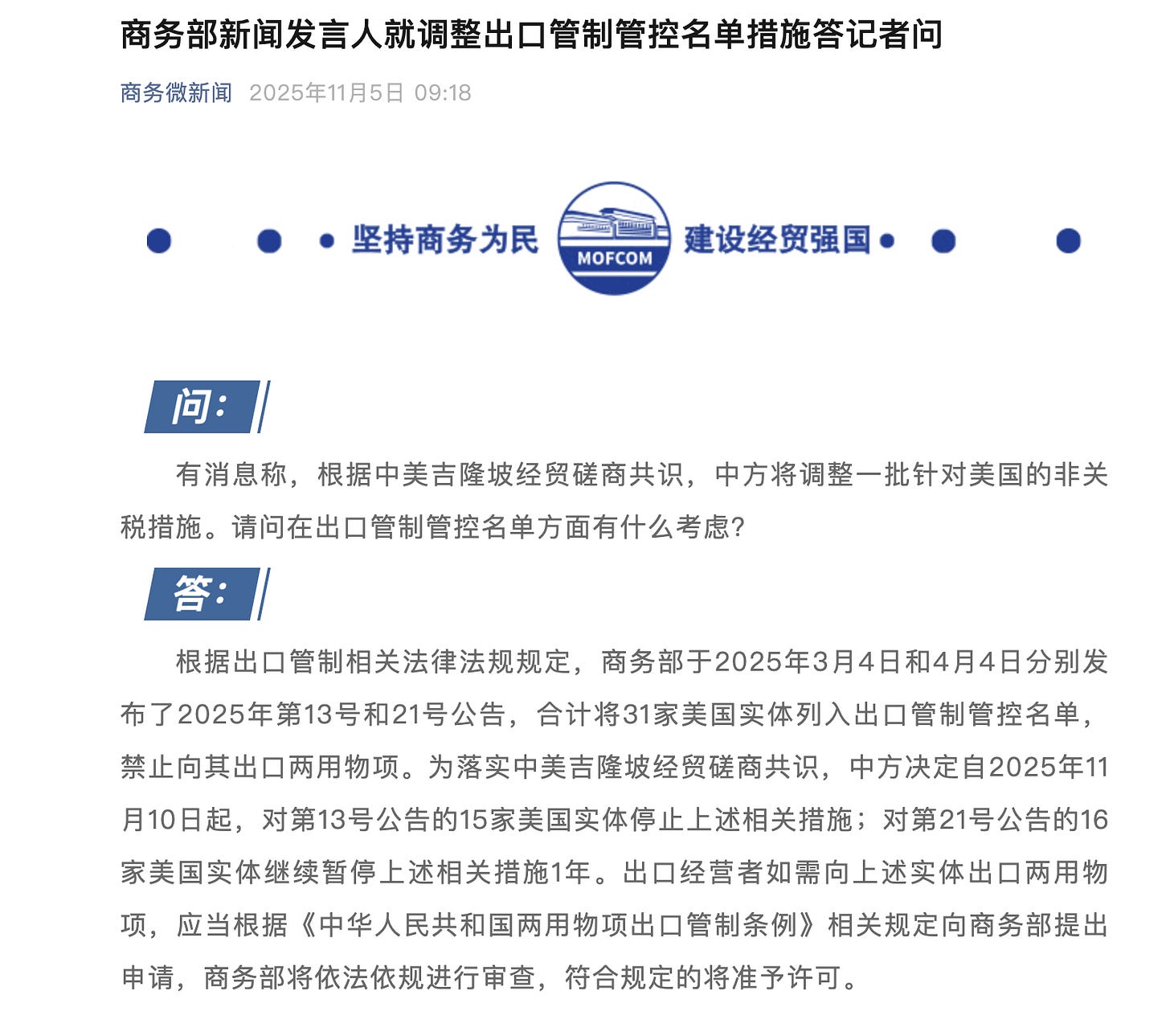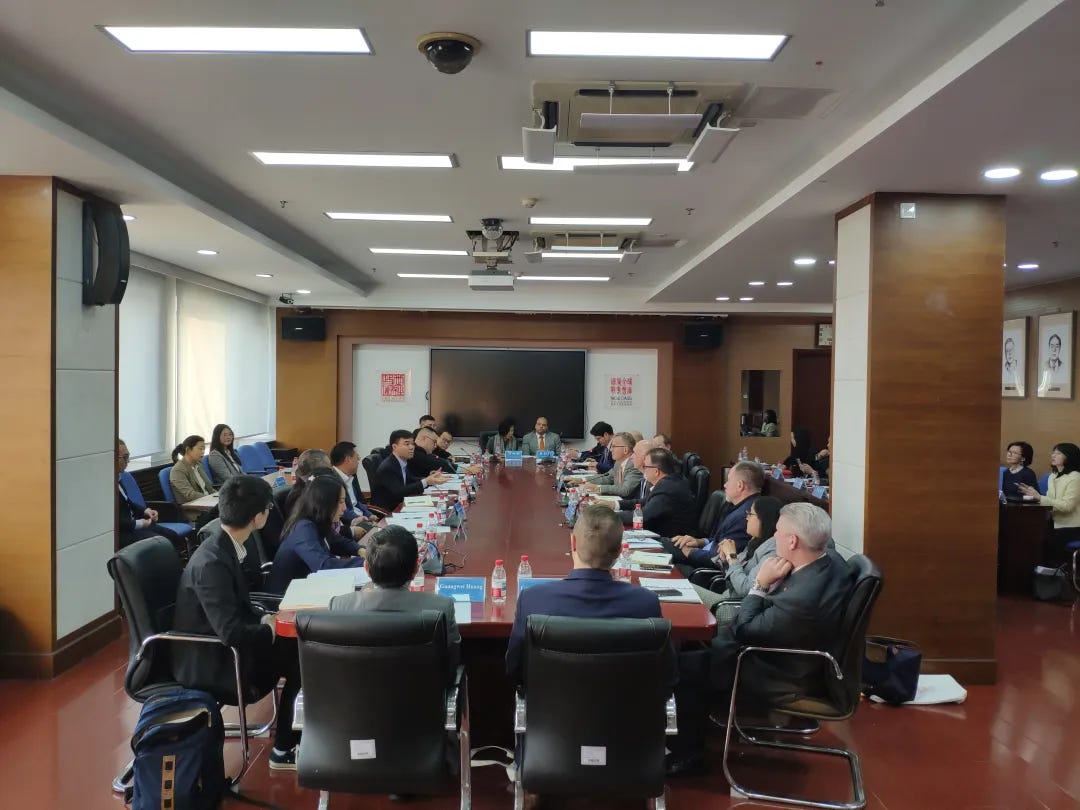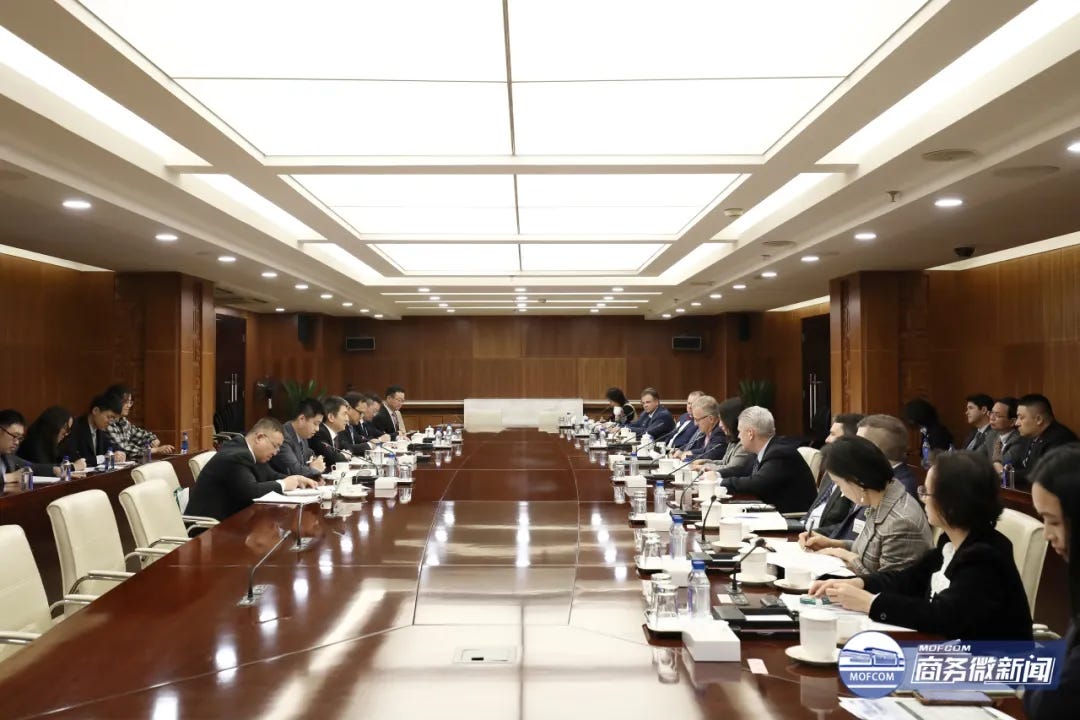China drops non-tariff retaliation to honor U.S. deal; top trade negotiator meets U.S. ag delegation
Today, MOFCOM announced, through its regular press Q&A, that it is fulfilling the commitment made during the Kuala Lumpur meeting to “suspend or remove all of the retaliatory non-tariff countermeasures taken against the United States since March 4, 2025.”
1/ The countermeasures introduced on March 4 in response to the U.S. fentanyl-related tariffs (adding 15 U.S. companies to the export control list and 10 U.S. companies to the unreliable entity list) will be terminated, since the U.S. has already terminated its 10% fentanyl tariff.
2/ The April reciprocal tariff countermeasures (adding 16 U.S. companies to the export control list and 11 to the unreliable entity list) will remain suspended, as the U.S. has also suspended those tariffs.
3/ China will also stop enforcing the anti-circumvention measures introduced on September 3, 2025, targeting U.S.-origin single-mode optical fibers with wavelength-shift features.
4/ On 7 November, Commerce suspended the rare earth FDPR. The General Administration of Customs also revoked the announcement on the suspension of imports of U.S. logs on the same day.
All these changes will take effect starting November 10, 2025.
On 5 November, one of the above US companies, Illumina, published a statement
Illumina Responds to Positive Updates from Chinese Ministry of Commerce
Nov 5, 2025
SAN DIEGO, Nov. 5, 2025 /PRNewswire/ -- The Chinese Ministry of Commerce (MOFCOM) today announced it will lift the export ban on Illumina, Inc. (NASDAQ: ILMN), which had been in place since March 4, 2025. While the ban will be lifted on November 10, Illumina remains on the Unreliable Entities List (UEL), requiring government approval for instrument purchases.
Illumina remains focused on achieving a positive resolution regarding its inclusion on the UEL and is committed to serving customers in this important market. For two decades, Illumina has been proud to partner with customers in China to advance genomics and improve human health.
“We are pleased with the announcement from MOFCOM, which is a very positive step forward. Illumina will continue to engage with authorities and stakeholders as we work toward a long-term resolution,” said Jacob Thaysen, CEO of Illumina. “I want to thank our customers for their trust and support, and our team in China and around the world for their dedication and resilience.”
Illumina is making no change to FY25 guidance, which was recently updated during the company’s Q3 2025 earnings call.
On November 10, Jacob Thaysen, the CEO of Illumina, met with Li Chenggang at the headquarters of MOFCOM. According to the Chinese readout, the two sides discussed topics such as U.S.-China economic and trade relations and Illumina’s development in China. Thaysen stated that Illumina has been deeply committed to the Chinese market for 20 years, is dedicated to long-term development in China, and is willing to continue increasing its investments in China and operate in full compliance.
The U.S. Embassy in China’s official WeChat account post a Chinese summary of the “Kuala Lumpur Agreement”. The post quickly reached over 100,000 views within a few hours.
Meanwhile, after China and the U.S. reached a soybean purchase agreement, a high-level U.S. agricultural trade delegation led by Jim Sutter, CEO of the U.S. Soybean Export Council (USSEC), has been visiting Beijing this week. On November 3, they met with experts at the Chinese Academy of Social Sciences.
Today, Li Chenggang met with the US ag delegation at MOFCOM. He emphasized that the recent fluctuations in China-U.S. agricultural trade were rooted in U.S. unilateral tariff, and urged Washington to work with Beijing to “create a favorable environment for practical cooperation in agriculture and other sectors.”
In addition to soybeans, trade in other agricultural products also seems to be restarting after the removal of retaliatory tariffs. According to Bloomberg, China is now looking to buy U.S. wheat for the first time in more than a year. A major Chinese grains importer reportedly made inquiries over the weekend for U.S. shipments loading between December and next February.
On 6 November, the white house published EO 14385 in the Federal Register, which continues the suspension of heightened reciprocal tariffs on imports from China until November 10, 2026, following the Kuala Lumpur Joint Arrangement agreement reached on October 30, 2025. It references prior EOs and implements commitments like China’s purchase of U.S. agricultural exports and suspension of retaliatory actions.
Separate but related, on the potential ease of high end NV AI chips export control, Yesterday, White House Press Secretary Karoline Leavitt appeared to confirm that the administration would not allow the sale of Blackwell chips to China, stating:
“The president has made his position on this very clear both to the Chinese and also to all of you. He’s answered this question directly. As for the most advanced chips — the Blackwell chip — that’s not something we’re interested in selling to China at this time.”
However, on the same day, Bessent appears to have given a more ambiguous answer, suggesting the U.S. government might ultimately allow Nvidia’s high-end chips to be sold to Chinese firms.
CNBC
I guess I’ll just ask you one quick question on China. A lot of talk about what actually went on with the Nvidia chips and the Blackwell chips. You, are you among the people in the administration that think that the China should never get those highly advanced AI chips? Or is this saving something to negotiate the future with? Because it always seems like these are stops along the way with these negotiations with China. They’re evolving and we continue to, you know, to deal with things and they continue to deal with things.
Bessent
Well, if we think about the Blackwell, now that they’re the crown jewel, that 18 months ago, the H20 were so good where the crown jewels. So Joe, I think what you’re describing is actually the pace that the technology is moving, not the pace that the negotiations are moving. So there may be a case down the road. I don’t know whether it’s 12 or 24 months, given the incredible innovation that goes on at Nvidia, where the Blackwell chips may be 2、3、4 down their chip stack in terms of efficacy. And at that point, they could be sold on.
This exchange highlights a persistent ambiguity, and even confusion, in the U.S. government’s public messaging: the terms “the most advanced chips” and “Blackwell chips” are being used interchangeably, though they are not the same thing.
“Blackwell” refers to a series of chips, not a single model. The B300 is currently the most advanced chip and is part of the Blackwell series. The B30A also belongs to the Blackwell family, but it is not the most advanced model. It remains unclear whether the U.S. government intends to block only the B300 from being sold to China, or whether all Blackwell-series chips, including the lower-end B30A, will also be restricted. Or maybe it just means a return to the previous “sliding scale” strategy.
Meanwhile, China is clearly moving to reduce its dependence on Nvidia through domestic policy:
1/ According to FT, China has increased subsidies that cut energy bills by up to half for some of the country’s largest data centres, in order to encourage tech companies to reduce their reliance on Nvidia and strengthen the homegrown semiconductor sector.
2/ Another Reuters report noted that the Chinese government has issued guidance requiring new data centre projects receiving any state funding to use only domestically produced AI chips.




